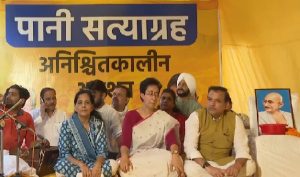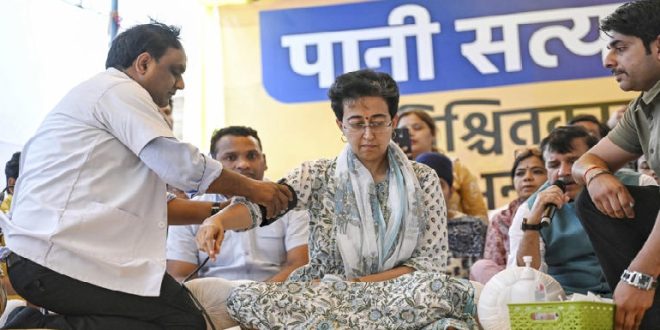25-06-2024
Bureau Report + Agencies
NEW DELHI: A Delhi city minister has started an indefinite hunger strike to demand more drinking water for India’s capital, where taps in some of its poorest neighborhoods are running nearly dry in the middle of searing heat.
“There are 2.8 million people in the city who are aching for just a drop of water,” Delhi Water Minister Atishi said on Monday, the fourth day of her fast.
 Millions of Indians face water shortages every summer when water demand rises in farms, offices and homes against a limited supply, but a prolonged heatwave this year has worsened the shortfall, including in Delhi and the southern tech hub of Bengaluru.
Millions of Indians face water shortages every summer when water demand rises in farms, offices and homes against a limited supply, but a prolonged heatwave this year has worsened the shortfall, including in Delhi and the southern tech hub of Bengaluru.
Delhi relies on the Yamuna River that runs through the capital for most of its water needs but the river slows down during dry summer months, causing shortages that lead to protests and calls for better water conservation.
Atishi blamed the neighboring farming state of Haryana for guzzling up a large share of river water.
Haryana’s government responded that it was Delhi’s mismanagement that was causing water shortages. Experts said a federal-level review of decades-old water sharing pacts was needed to accommodate population growth.
Delhi, a city of 20 million people, is one of the world’s most densely populated capitals, where upscale neighborhoods and manicured lawns are just a few miles away from unplanned working-class areas and slums but, in contrast to growing unplanned development over the years, the city’s water allocation from rivers has remained unchanged since 1994, said Depinder Kapur, the director of water program at think tank Centre for Science and Environment.
“What was true 10-15 years ago is not true anymore. So, there is a situation of crisis and it’s a distribution issue,” he said.
The Delhi government is working on plans to improve the groundwater table by reviving lakes and storing water overflow from the Yamuna during the seasonal monsoon rains, but officials say the summer shortfall is difficult to tackle by these measures alone.
 “Water crisis in Delhi is a year-long crisis because extreme temperatures are not going anywhere,” said environmentalist Vimlendu Jha. “Delhi needs a comprehensive water management plan in which Yamuna can’t be the only major source of water.”
“Water crisis in Delhi is a year-long crisis because extreme temperatures are not going anywhere,” said environmentalist Vimlendu Jha. “Delhi needs a comprehensive water management plan in which Yamuna can’t be the only major source of water.”
India recorded more than 40,000 suspected heatstroke cases this summer as a prolonged heatwave killed more than 100 people across the country, while parts of its northeast grappled with floods from heavy rain, authorities said.
Billions across Asia are grappling with extreme heat this summer in a trend scientists say has been worsened by human-driven climate change, with temperatures in north India soaring to almost 50 degrees Celsius (122 degrees Fahrenheit) in one of the longest heatwave spells recorded.
Birds fell from the skies due to extreme heat and hospitals reported an inflow of heat-affected patients as both day and night time temperatures peaked in recent weeks since the start of summer in March.
The health ministry ordered federal and state institutions to ensure “immediate attention” to patients, while hospitals in the capital Delhi, which is also facing a water shortage, were directed make more beds available.
A health ministry official said there were more than 40,000 suspected heatstroke cases and at least 110 confirmed deaths between March 1 and June 18, when northwest and eastern India recorded twice the usual number of heatwave days.
 Pressmediaofindia
Pressmediaofindia




